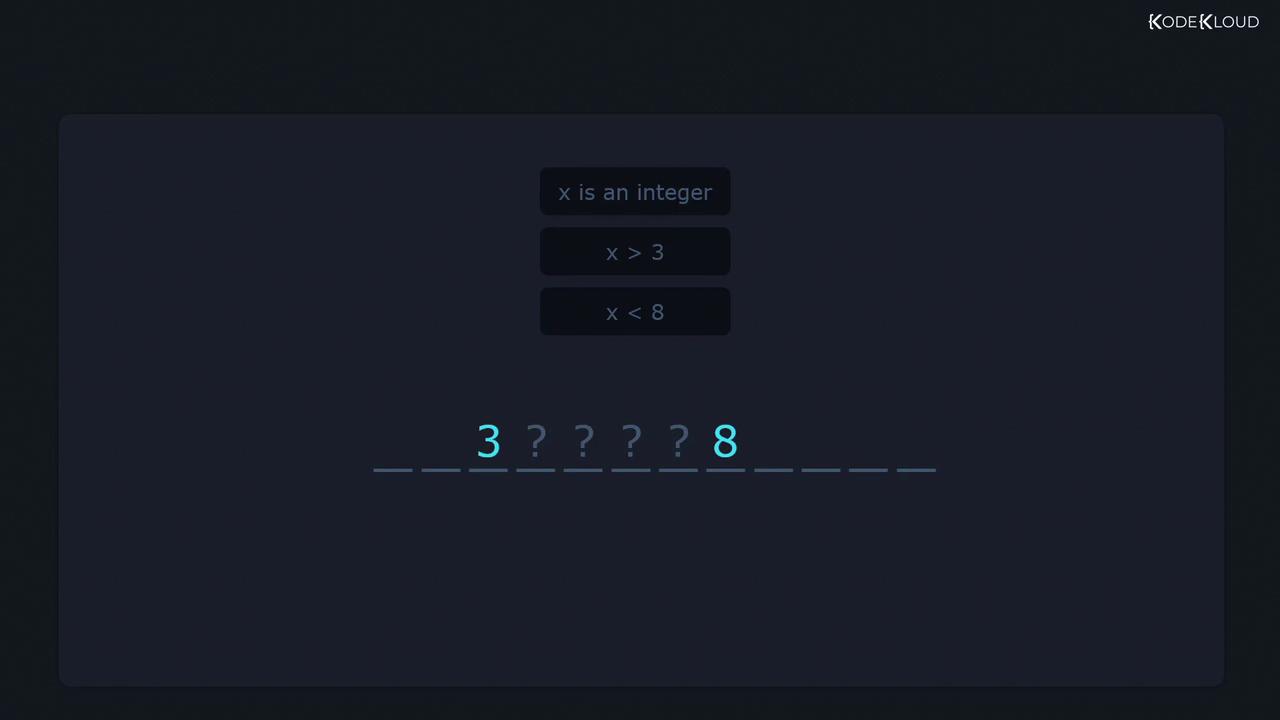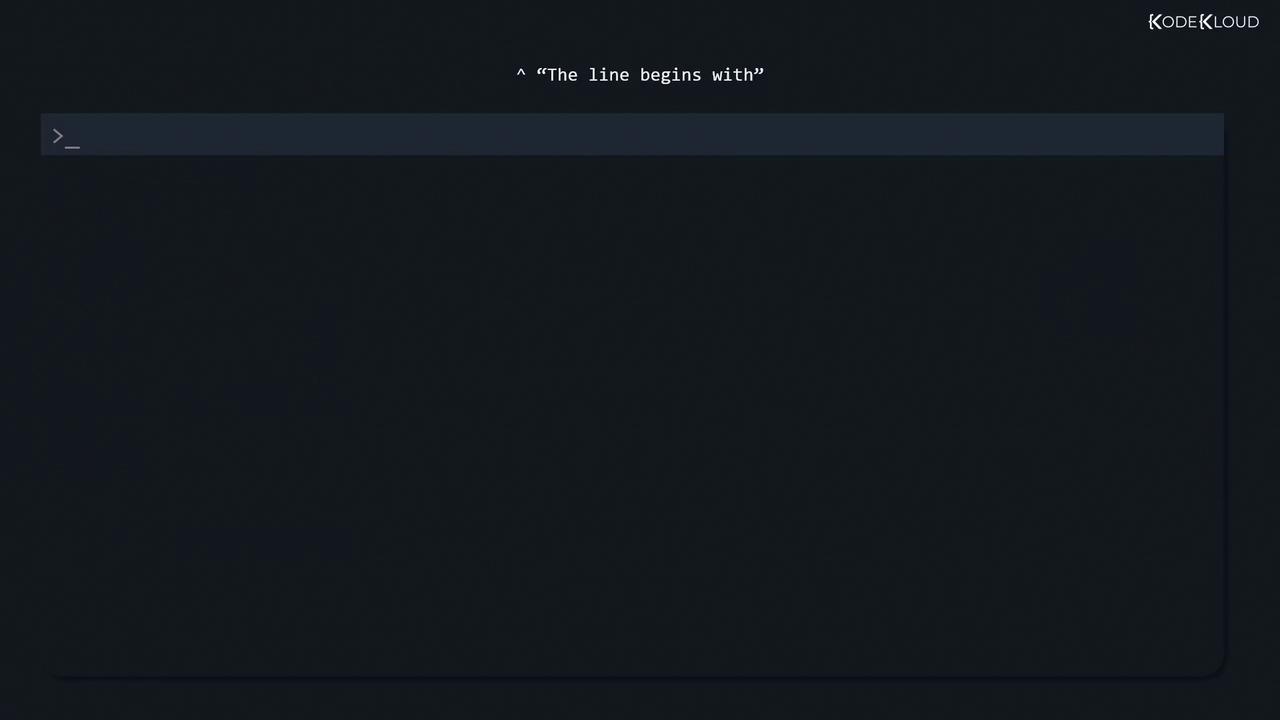Linux System Administration for Beginners
Essential Commands
Analyze text using basic regular expressions
Regular expressions (regex) let you define complex search patterns that go beyond simple grep queries. For instance, when you need to extract all IP addresses (e.g., 203.102.3.5) from hundreds of scattered files, a basic search for numbers and dots may yield invalid matches like 1.2. Regex allows you to impose precise conditions—just as you specify “x > 3” and “x < 8” in a math puzzle to limit x to 4, 5, 6, or 7.

In the sections below, we’ll explore essential regex operators and examples using grep to filter and analyze text on Linux.
Core Regex Operators
| Operator | Description |
|---|---|
| ^ | Beginning of line |
| $ | End of line |
| . | Any single character |
| * | Zero or more occurrences of the preceding element |
| + | One or more occurrences of the preceding element |
| {} | Specify a minimum and/or maximum number of occurrences |
| ? | Zero or one occurrence of the preceding element |
| | | Alternation (logical OR) |
| [] | Character class (match any one character inside) |
| () | Grouping |
| [^] | Negated character class (match any character not inside) |
![The image displays a set of regex operators, including symbols like `^`, `$`, `.`, `*`, `+`, `{}`, `?`, `|`, `[]`, `()`, and `[^]`.](https://kodekloud.com/kk-media/image/upload/v1752881463/notes-assets/images/Linux-System-Administration-for-Beginners-Analyze-text-using-basic-regular-expressions/regex-operators-symbols-set.jpg)
Below are practical grep examples—starting simple and building in complexity.
The Caret (^) – Match Beginning of Line
Given a file names.txt:
$ cat names.txt
adam
adnan
basam
samad
samuel
sheela
ravi
mausami
A plain search for sam returns any line containing that substring:
$ grep 'sam' names.txt
basam
samad
samuel
mausami
To match only lines that start with sam, anchor the pattern with ^:
$ grep '^sam' names.txt
samad
samuel

The Dollar Sign ($) – Match End of Line
To find lines ending with a pattern, append $:
$ grep 'sam$' names.txt
basam
In system files like /etc/login.defs, search for lines containing the digit 7:
$ grep '7' /etc/login.defs
# 022 is the default value, but 027, or even 077, could be considered
HOME_MODE 0700
PASS_WARN_AGE 7
To list only those ending in 7:
$ grep '7$' /etc/login.defs
PASS_WARN_AGE 7
And lines ending with mail:
$ grep 'mail$' /etc/login.defs
MAIL_DIR /var/spool/mail
#MAIL_FILE .mail
The Dot (.) – Match Any Single Character
A dot (.) matches exactly one character. For example, c.t will match cat, cut, c1t, and even parts of longer strings:
$ grep -r 'c.t' /etc/
/etc/man_db.conf:# manpath. If no catpath string is used, the catpath will default to the
/etc/man_db.conf:# the database cache for any manpaths not mentioned below unless explicitly
...
To restrict matches to whole words, use the -w option:
$ grep -wr 'c.t' /etc/
/etc/brltty/Input/mn/all.txt:Left: append to existing cut buffer from selected character
...
Escaping Special Characters
To match a literal dot instead of using . as a wildcard, escape it with a backslash:
$ grep '\.' /etc/login.defs
HOME_MODE 0700
PASS_WARN_AGE 7
The Asterisk (*) – Zero or More Occurrences
The asterisk (*) applies to the preceding element, allowing zero or more matches. For instance, let* matches le, let, lett, letttt, etc.:
$ grep -r 'let*' /etc/
/etc/pm2ppa.conf:# configuration file (/etc/pm2ppa.conf), and not from configuration files
/etc/pm2ppa.conf:#leftmargin 10
...
To match any path segment between slashes:
$ grep -r '/.*/' /etc/
/etc/man_db.conf:# before /usr/man.
/etc/man_db.conf:MANDB_MAP /usr/man
...
The Plus (+) – One or More Occurrences
The plus operator requires at least one occurrence of the preceding element.
Note
Use \+ in basic grep to enable the plus operator, or switch to extended regex with grep -E.
$ grep -r '0\+' /etc/
/etc/pnm2ppa.conf:#colorshear 0
/etc/pnm2ppa.conf:#blackshear 0
...
If you omit the backslash (e.g., grep -r '0+' /etc/), + is treated literally, not as a quantifier.
Extended Regular Expressions
To avoid escaping metacharacters like +, use extended regex with grep -E or egrep:
$ grep -Er '0+' /etc/
With this foundation, you can harness regex patterns in Linux to perform precise text analysis and filtering.
References
Watch Video
Watch video content